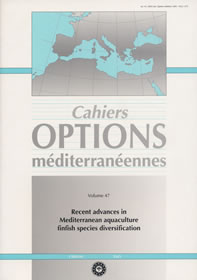| Article précédent | p. 259-266 | Article suivant |
Food intake, growth, and body composition in Mediterranean yellowtail (Seriola dumerilii) fed isonitrogenous diets containing different lipid levels
Wild-caught Seriola dumerilii were fed isonitrogenous extruded dry diets which contained four lipid levels, for 118 days, at 18 degrees C. Growth, feed:gain ratio, body composition and feed intake were measured. Growth rates were not affected by diet composition, however, feed:gain ratio and feed intake varied inversely with dietary energy level. In fish up to 500 g, the present study indicates that low protein, high energy dense diets similar to those used in the intensive salmonid production gives high growth rates and feed conversion efficiency. Little effect of diet composition on relative organ size and body composition was observed. The relatively low protein requirement indicated by these trials is likely to prove more cost-effective than traditional, high protein diets. Based on growth performance, and of the closely related Japanese yellowtail, S. quinqueradiata, S. dumerilii would appear to have considerable potential in aquaculture in the Mediterranean, as it has in other regions.
- [ Afficher ]
- [ Télécharger ]
- [ Exporter la citation ]
Vous pouvez télécharger la citation au format :
- [ Imprimer ]
-
Mots-clés
COMPOSITION GLOBALE, CROISSANCE, ETAT CORPOREL, REGIME ALIMENTAIRE, SERIOLECiter cet article
Talbot C., García-Gómez A., Gándara F. de la, Muraccioli P. Food intake, growth, and body composition in Mediterranean yellowtail (Seriola dumerilii) fed isonitrogenous diets containing different lipid levels. Recent advances in Mediterranean aquaculture finfish species diversification. Zaragoza : CIHEAM, 2000. p. 259-266. (Cahiers Options Méditerranéennes; n. 47). Seminar of the CIHEAM Network on Technology of Aquaculture in the Mediterranean on 'Recent advances in Mediterranean aquaculture finfish species diversification', 1999/05/24-28, Zaragoza (Spain). http://om.ciheam.org/om/pdf/c47/00600626.pdf



